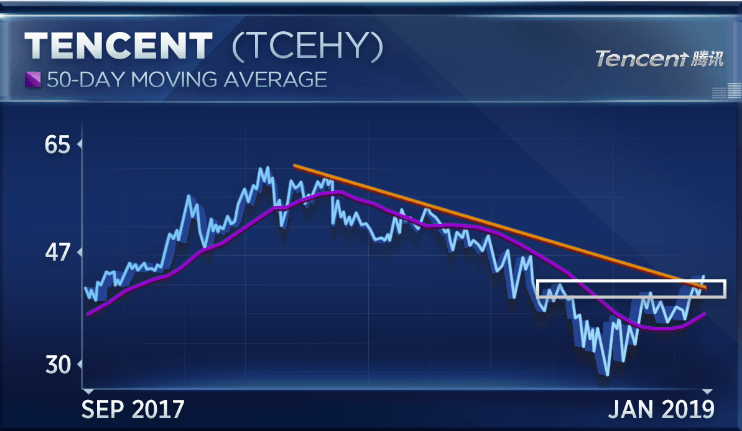Despite official 2018 GDP figures showing that the Chinese economy grew last year at its slowest pace in 28 years, some of China’s largest stocks continue to perform at market-leading levels, led by tech quartet Tencent, Baidu, Sina and Alibaba.
According to the data released by Beijing on Monday, China recorded a GDP growth rate of 6.6 percent – its slowest rate since 1990 – driven by pressure from U.S. trade tariffs and lower domestic demand.
This slowdown has not however affected the stock market fortunes of the afore-mentioned and other top U.S. – listed Chinese stocks, which have started 2019 with an 8 percent rally. Market analysts believe that this is happening because ongoing Chinese trade woes have no real significant bearing on the long-term fortunes of these companies, hence their stocks are underpriced.
Tencent Leads The Hotshots

Internet giant Tencent is at the vanguard of this elite group of stocks, with Piper Jaffray Chief Market Technician Craig Johnson suggesting that its moving average heralds an imminent 13 percent jump from its Q4 2018 valuation. Speaking on CNBC’s Trading Nation on Friday, Johnson said:
There’s certainly some opportunities to trade here, If I look at the chart of Tencent, here’s a stock that’s traded off meaningfully. We’ve now just reversed the downtrend. When we’ve seen a MACD [Moving Average Convergence Divergence] buy signal happen like we have right here, we’ve seen that 30 days later that the stock is typically up almost 13 percent. This would be one we’d be buying.
While Tencent and other Chinese stocks continue to rally impressively, slowing Chinese economic growth is becoming an increasing cause for concern in Beijing, with consequences already being felt by large scale manufacturers such as Apple Inc.
Chantico Global CEO Gina Sanchez on her part believes that regardless of any trade disputes or other extraneous issues, Chinese stocks remain fundamentally undervalued even after the ongoing rally. As such she believes, there is a clear and obvious investment opportunity therein, and they are a “buy”.
China’s Economic Slowdown
The ongoing trade dispute with the U.S. government is hardly helping matters, with ongoing talks to reach a trade deal apparently deadlocked. Many, however, believe that even if China were to somehow strike a deal with the U.S. today, this will still not solve the fundamental problems creating the current shaky economic conditions.
Speaking to Reuters, Chen Xingdong, chief China economist at BNP Paribas said:
What China can really do this year is to prevent deflation, prevent a recession and a hard landing in the economy.
To this end, Chinese lawmakers are pushing through a raft of reforms and legislation aimed at cutting down import duties and taxes as well as speeding up construction projects in a bid to encourage consumer demand. Reserves have also been cut down and lending rates reduced in an attempt to shelter smaller firms from being fully hit. More reserve cuts are expected at the start of the new quarter as well as lower tax rates and more tax cuts.








